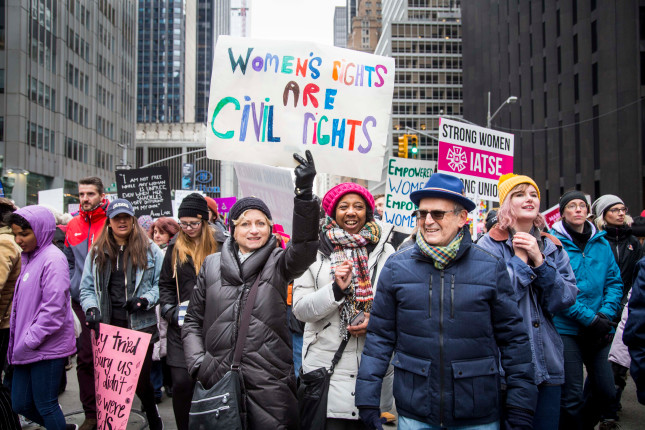-
What Changes When We See Women
November 13, 2019 By Valerie M. Hudson To commemorate the 25th anniversary of the Wilson Center’s Environmental Change and Security Program, I have a prediction: by ECSP’s 50th anniversary, the idea that one could discuss national and international security without examining the situation, status, and security of women will be seen as laughably naïve. Over the next twenty-five years, I predict that every “Intro to International Relations” and “Intro to National Security” class (and every QDR and QDDR) will begin by examining the critical linkage between what is going on with women and what is going on with nation-states.
To commemorate the 25th anniversary of the Wilson Center’s Environmental Change and Security Program, I have a prediction: by ECSP’s 50th anniversary, the idea that one could discuss national and international security without examining the situation, status, and security of women will be seen as laughably naïve. Over the next twenty-five years, I predict that every “Intro to International Relations” and “Intro to National Security” class (and every QDR and QDDR) will begin by examining the critical linkage between what is going on with women and what is going on with nation-states.
To commemorate the 25th anniversary of the Wilson Center’s Environmental Change and Security Program, I have a prediction: by ECSP’s 50th anniversary, the idea that one could discuss national and international security without examining the situation, status, and security of women will be seen as laughably naïve. Over the next twenty-five years, I predict that every “Intro to International Relations” and “Intro to National Security” class (and every QDR and QDDR) will begin by examining the critical linkage between what is going on with women and what is going on with nation-states.
Bold predictions, perhaps, but they are based on my experience as co-author of the forthcoming book, The First Political Order: How Sex Shapes Governance and National Security Worldwide (Columbia University Press, February 2020). In that book, Donna Lee Bowen, Perpetua Lynne Nielsen, and I report on the results of a decade-long research project, the final four years of which was primarily funded by the Minerva Initiative (ARO) of the US Department of Defense. While insecure conditions within states can undoubtedly cause a greater degree of insecurity for women, we investigate the converse proposition—namely, that the insecurity of women can cause nation-state insecurity.
Our theoretical framework suggests that throughout history, the primary security provision mechanism of human groups has been the extended male kin group, often referred to as clans or tribes. In order to facilitate male alliances that remove barriers to male cooperation in physical defense, the fraternity of male kinship has been prioritized in the vast majority of historical and even contemporary human societies. To create and maintain that fraternity, a systematic subordination of female interests to male interests has to be enforced. In addition to its enforcement by gender-based violence, we argue that practices such as polygyny, brideprice, dowry, lack of female property rights, inequitable family law, an early age of marriage for girls, female infanticide and neglect, patrilocal marriage, cousin marriage, and other practices create a straitjacket for women within their own households.
This was brought home to me almost a dozen years ago in a crucial conversation which changed the course of my research. My university at the time was hosting a group of the first female Members of Parliament (MPs) in Afghanistan. I was seated at lunch next to one of these MPs, and I began to hold forth on how she, as a university-educated female MP, was a symbol of the new empowerment of women in her country. She turned to me and said, “Valerie, I could go home today, and my husband could divorce me by simply saying the phrase ‘I divorce you’ three times. If he did, I would lose custody of my children and would have nowhere to live. Even if he does not divorce me, I may have little say in when and to whom my children are married. How empowered am I really, Valerie?”
I realized at that moment that I had been looking in the wrong place for women’s empowerment, or lack thereof. It’s not to be found in female literacy or years of education or labor-force participation, or even representation in government, because all of these positive indicators can be present and, at the same time, women still profoundly subordinated.
No, we need to look at the first political order, which is the sexual political order. If relations between men and women in a society are rooted in autocracy, exploitation, violence, insecurity, and even terror, it primes the society for the same fate. Through careful historical process-tracing, in-depth case studies, and rigorous large-N statistical analysis, we are able to demonstrate the reality of this linkage. We are also able to trace how certain societies broke free from this toxic syndrome of female subordination, and in doing so, achieved a much more stable, prosperous, and secure future for their people.
In a sense, then, after writing this meticulously documented book, we believe it will no longer be possible to call oneself a realist without acknowledging the importance of the first political order to national security. If that is so, many aspects of foreign and national security policy would change. To give but one example, the global eradication of the practice of child marriage would do more for national and international security than almost any other conceivable policy initiative. Such an approach would indisputably be part of any realist “grand” strategy to promote international stability, and yet to date has been completely overlooked by those who write tomes on the subject.
No worries; by ECSP’s 50th anniversary, realism will finally prevail, and it will be widely understood that the surest way to curse one’s nation-state is to curse its women. I live for the day when that curse is lifted once and for all.
Valerie M. Hudson is a University Distinguished Professor and holds the George H.W. Bush Chair in the Department of International Affairs of the Bush School of Government and Public Service at Texas A&M University, where she directs the Program on Women, Peace, and Security.
Photo Credit: Group of people walking together – sign reads “Women’s Rights are Civil Rights” in Midtown Manhattan during the NYC Women’s March – New York, NY, USA January 1/19/2019 Women’s March. Photo via Shutterstock. All rights reserved.
 A Publication of the Stimson Center.
A Publication of the Stimson Center.

 To commemorate the 25th anniversary of the Wilson Center’s Environmental Change and Security Program, I have a prediction: by ECSP’s 50th anniversary, the idea that one could discuss national and international security without examining the situation, status, and security of women will be seen as laughably naïve. Over the next twenty-five years, I predict that every “Intro to International Relations” and “Intro to National Security” class (and every QDR and QDDR) will begin by examining the critical linkage between what is going on with women and what is going on with nation-states.
To commemorate the 25th anniversary of the Wilson Center’s Environmental Change and Security Program, I have a prediction: by ECSP’s 50th anniversary, the idea that one could discuss national and international security without examining the situation, status, and security of women will be seen as laughably naïve. Over the next twenty-five years, I predict that every “Intro to International Relations” and “Intro to National Security” class (and every QDR and QDDR) will begin by examining the critical linkage between what is going on with women and what is going on with nation-states.




